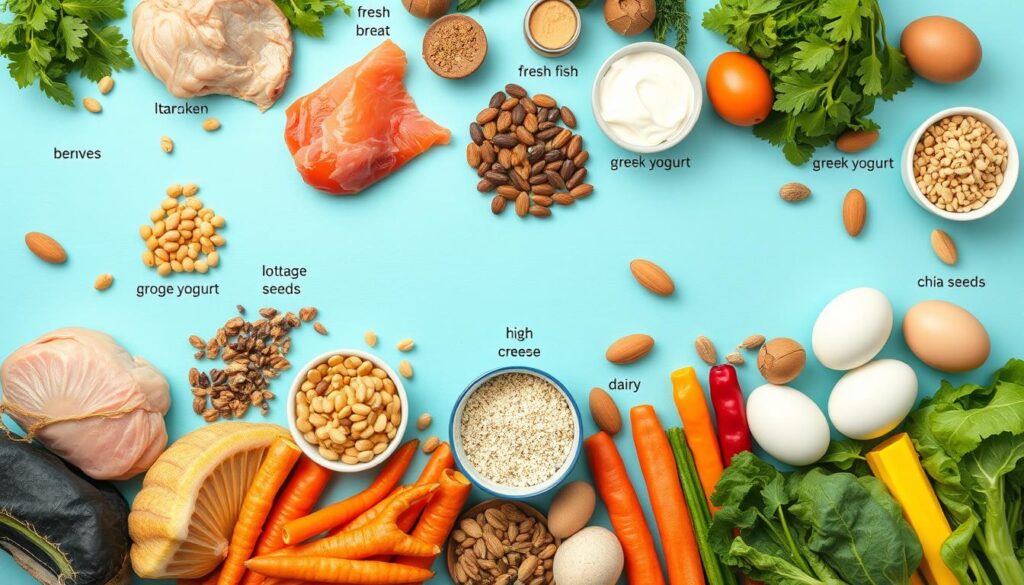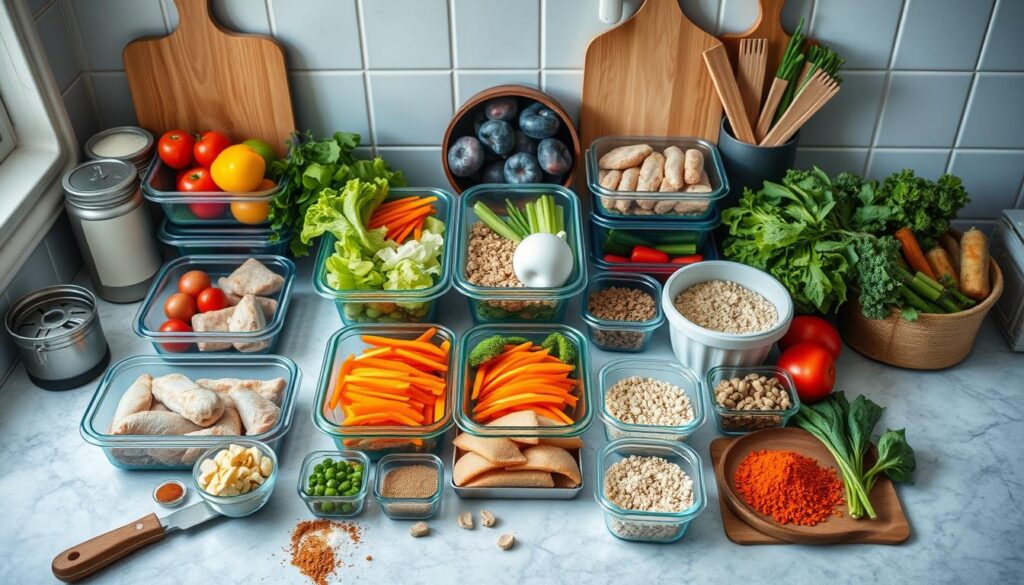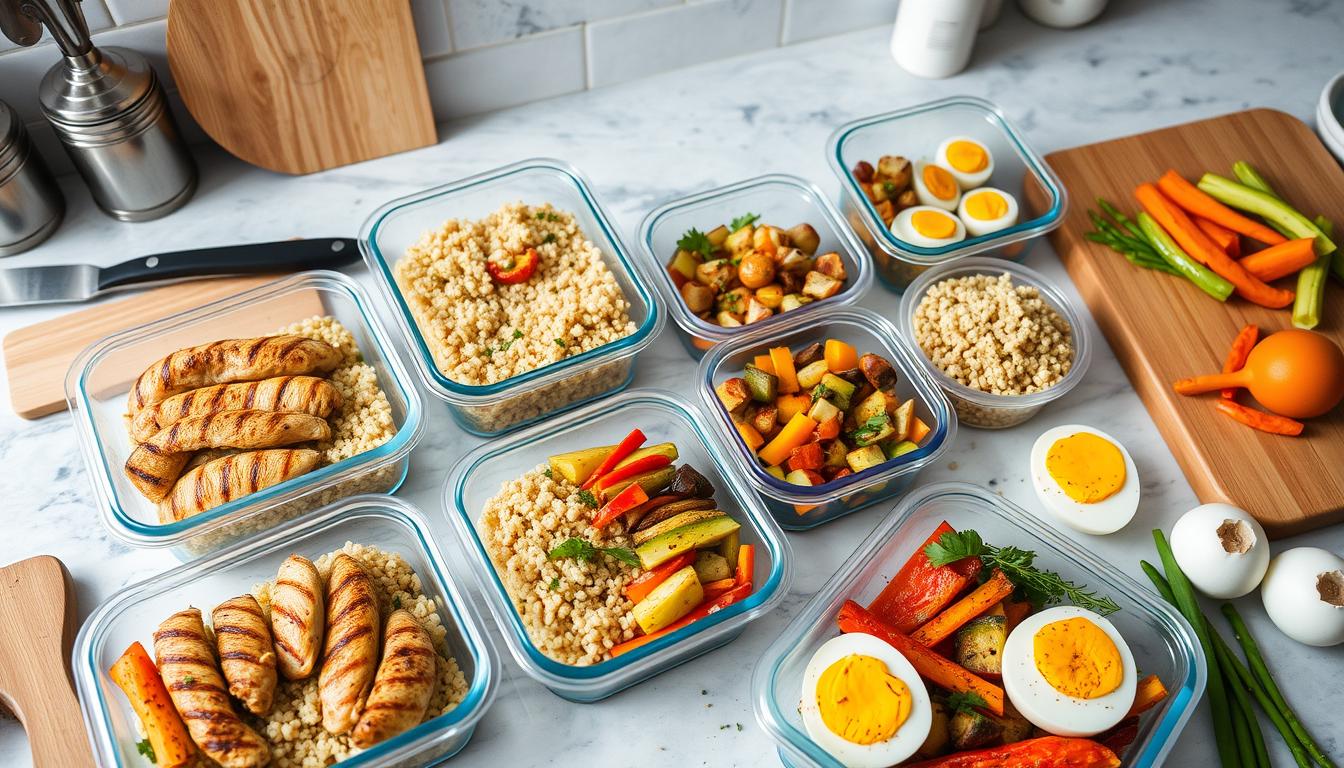As a busy professional, planning healthy meals can seem overwhelming. But high protein meal prep has changed my life. It makes it easy to fuel my active lifestyle with nutritious meals.
By spending a few hours each week, I meet my protein needs. This helps maintain muscle and manage weight. It also saves time and reduces stress, making it easier to choose healthy foods.
In this guide, I’ll share how to make meal prep a part of your life. Whether you’re new to meal prep or experienced, you’ll find helpful tips. Get ready to enjoy stress-free, protein-rich meals all week.
Table of Contents
Understanding the Benefits of High Protein Meal Planning
Adding high-protein meals to your meal prep has many benefits. It’s great for bodybuilding nutrition, keeping a muscle-building diet, or just improving your post-workout meals. Getting the right amount of protein is crucial.
Weight Management and Muscle Maintenance
Protein is key for keeping and growing lean muscle. Eating enough protein with each meal helps your body repair and grow muscles. This boosts your metabolism and helps burn calories, aiding in weight control.
Time and Money Savings
Planning high-protein meals saves time and money. By cooking protein-rich dishes in bulk, you have healthy meals ready all week. This reduces the need for expensive or unhealthy fast foods.
Stress Reduction and Better Food Choices
Protein-focused meal prep reduces stress and improves food choices. Having a meal plan means you’re less likely to choose unhealthy options when hungry. This leads to better overall health and a more balanced life.
“Eating 25 grams of soy protein daily may help lower cholesterol.”
| Protein Source | Protein Content |
|---|---|
| Beans | 1 and a quarter cup provides approximately the same amount of protein as 3 ounces of broiled steak. |
| Fish (Salmon, Tuna) | Rich in omega-3 fatty acids, these are good protein options and beneficial for heart health. |
| Lean Cuts of Beef | Top round steak has barely more saturated fat than skinless chicken breast. |
| Pork | Cuts like tenderloin, top loin, rib chops, sirloin steak, or shoulder blade steaks are leaner options. |
| Eggs | A good source of lean protein that do not necessarily raise cholesterol levels. |
| Dairy (Milk, Cheese, Yogurt) | Provide protein and calcium for strong bones and a healthy heart. |
Essential Kitchen Tools and Storage Containers for Meal Prep
Starting a meal prep routine is easier with the right tools and containers. Invest in quality appliances, utensils, and containers. This will make your food prep faster and keep your meals fresh and tasty.
First, get a good blender, like the Vitamix, for smoothies and soups. An Instant Pot or slow cooker, like the Crockpot, makes batch cooking easy. This saves you time in the kitchen.
Next, get sharp knives, sturdy cutting boards, and measuring cups and spoons. These basics help you chop and measure ingredients quickly and efficiently.
For meal prep containers, choose various sizes for different meals. Glass containers are great for oven or microwave reheating. BPA-free plastic containers are durable and convenient. Having both types is a good idea.
| Container Material | Advantages | Disadvantages |
|---|---|---|
| Glass |
|
|
| Plastic |
|
|
| Stainless Steel |
|
|
Choose a variety of containers based on your cooking style and needs. Consider cost, convenience, and safety. With the right tools and containers, you’ll enjoy a successful meal prep routine.
Calculating Your Daily Protein Requirements
Finding out how much protein you need is key for keeping muscle, managing weight, and staying active. The amount of protein you should eat depends on your age, weight, how active you are, and your fitness goals.(500 cal recipes)
Factors Affecting Protein Needs
Experts usually say you should eat 0.8 to 1 gram of protein for every kilogram of your body weight each day. For example, if you weigh 150 pounds (68 kilograms), you might need 54 to 68 grams of protein daily. But, this is just a starting point, and your needs could be different.
Things that can change how much protein you need include:
- Age: Older people might need more protein to keep their muscles strong.
- Gender: Men and those assigned male at birth (AMAB) often need more protein because they have more muscle.
- Activity level: People who exercise a lot might need 1.2-2 grams of protein per kilogram of body weight per day to help their muscles grow and recover.
- Health conditions: People with kidney disease might need to eat less protein to protect their kidneys.
Protein Distribution Throughout the Day
To get the most from protein, spread it out over the day. Try to have 25-30 grams of protein at each meal and 10-15 grams in snacks. This helps your body use the amino acids better.
Special Considerations for Athletes
If you’re an athlete or very active, you might need more protein to help your muscles grow, repair, and recover. Talk to a healthcare provider or registered dietitian to figure out how much protein you need. They can help you make a meal plan that fits your needs.
The best way to find out how much protein you need is to talk to a healthcare professional or registered dietitian. They can look at your specific situation and give you advice tailored to your health and fitness goals.
High Protein Meal Prep Shopping List
Fueling your body with the right nutrients is key for a successful meal prep routine. Your shopping list should include protein-rich foods to support your fitness goals. These foods will keep you feeling full throughout the day.
Start by buying lean protein sources like grass-fed organic ground beef, organic ground turkey, and organic spicy Italian chicken sausages. Also, pick up a carton of pasture-raised eggs. For seafood, choose wild-caught cod to add variety to your meals.
For quick snacks, grab turkey or chicken deli meat. A tub of protein powder is also a good addition for smoothies and treats.
- Grass-Fed Organic Ground Beef
- Organic Ground Turkey
- Organic Spicy Italian Chicken Sausages
- Pasture-Raised Eggs
- Wild-Caught Cod
- Turkey or Chicken Deli Meat
- Protein Powder
Balance your protein with fresh produce like avocado, green onion, red onion, bell peppers, bananas, ginger root, jalapeños, lemons & limes, oranges, Honeycrisp apples, and broccolini. These foods offer essential vitamins, minerals, and fiber.
For protein-rich snacks, include meat sticks, Simple Mills crackers, RX Bars, and Siete chips in your containers. Dairy alternatives like almond milk, Siete tortillas, Kite Hill dairy-free sour cream, and cheese are also great for your recipes.
Remember to buy versatile pantry items like frozen fruit for smoothies, hummus, Siete taco seasoning, and organic basmati rice. With these items, you’ll have delicious and satisfying meals all week.

Best Protein Sources for Meal Prepping
Choosing the right protein sources is key for meal prepping. You can pick from animal-based, plant-based, and protein-rich supplements. Each has its own benefits for your health and fitness goals.
Animal-Based Proteins
Animal-based proteins are lean and versatile. They are a favorite among meal preppers. Here are some top picks:
- Chicken breast
- Lean beef
- Eggs
- Fish, such as salmon, tuna, and tilapia
Plant-Based Protein Options
Looking for vegan or vegetarian options? There are many to choose from. Here are some high-protein plant-based foods:
- Tofu and tempeh
- Lentils and chickpeas
- Quinoa
- Nut butters
Protein-Rich Supplements
Supplements can add to your protein intake. They’re easy to use and convenient. Here are some popular ones:
- Whey protein, a fast-absorbing protein
- Casein protein, great for muscle recovery
- Plant-based protein powders like pea, soy, or hemp protein
Mix up your protein sources to get all the amino acids. This keeps your meals interesting and nutritious. With the right mix, you’ll succeed in your high-protein meal prep.
Step-by-Step High Protein Meal Prep Guide
Learning to prep high-protein meals can change your health and fitness for the better. Planning, preparing, and portioning meals ahead saves time and stress. It also makes sure you eat the right foods. Let’s explore a step-by-step guide to help you master your weekly high-protein meal prep.
- Plan Your Meals: Begin by planning your meals for the week. Think about what you need, like, and your health goals. This helps you make a balanced menu with lots of protein, like chicken, turkey, and fish.
- Batch Cook Protein-Rich Ingredients: Cook proteins in big batches to save time. Make ground turkey, slow-cooker chicken, or baked salmon in large amounts. This way, you always have protein ready to go.
- Prepare Versatile Sides: Make sides that are full of nutrients and can go with many meals. Try roasted veggies, quinoa, hard-boiled eggs, and cut fruits and veggies.
- Portion and Store Meals: Once your proteins and sides are ready, divide them into single servings. This makes it easy to grab a meal and helps you keep portion sizes right.
- Label and Organize: Label each container with what’s inside and when it was made. This keeps your meals fresh and helps you eat the newest ones first.
- Mix and Match: When it’s time to make your meals, get creative. Mix different ingredients to keep your meals interesting and varied.
By following these steps, you’ll enjoy tasty, healthy meals all week. Batch cooking and meal prep simplify your life, support your health, and help you reach your fitness goals.

| Protein Source | Serving Size | Protein Content |
|---|---|---|
| Chicken Thighs | 3.5 oz cooked | 31g |
| Ground Turkey | 3.5 oz cooked | 24g |
| Salmon | 3.5 oz cooked | 23g |
| Shrimp | 3.5 oz cooked | 20g |
| Lean Beef | 3.5 oz cooked | 26g |
| Pork | 3.5 oz cooked | 26g |
| Eggs | 1 large egg | 7g |
| Turkey Breast | 3.5 oz cooked | 29g |
Success in high-protein meal prep is about finding a balance. Try different methods and recipes to find what fits your life and taste. Enjoy your meals!
Make-Ahead Protein-Packed Breakfast Ideas
Start your day with a protein-rich breakfast. These make-ahead options save you time and give you the energy you need.
Quick Morning Protein Solutions
Try overnight oats with Greek yogurt and protein powder for a quick boost. Chia seed puddings with almond milk and berries are also great. Blend a smoothie pack with Greek yogurt, peanut butter, and fruit or greens for a quick morning drink.
Batch Cooking Breakfast Options
Batch cooking can make mornings easier. Make egg muffins with ham, cheese, and veggies ahead of time. Protein pancakes or waffles are also good, with 15 grams of protein per serving. Try cottage cheese breakfast bowls or steel-cut oatmeal for a savory option.
With a bit of planning, you can have a healthy high-protein breakfast every day. This will help you stay energized and focused throughout the morning.
Lunch and Dinner Prep Strategies
For lunch and dinner, aim for balanced meals with lean proteins, complex carbs, and lots of veggies. Cook proteins like grilled chicken or baked fish in big batches at the start of the week. This makes it easy to whip up tasty meals on busy days.
Pair your proteins with whole grains like quinoa or brown rice. Roast veggies like broccoli, sweet potatoes, and bell peppers too. Use meal prep containers for lunches to keep portions right and food fresh. Salads in jars are great, with dressing kept separate to avoid sogginess.
Try a “theme night” approach, like “Taco Tuesday” or “Stir-Fry Friday.” It makes meal planning fun and helps you prep dishes ahead of time. This simplifies your meal prep routine.
FAQ
What are the benefits of high protein meal prep?
What essential tools are needed for meal prepping?
How much protein do I need daily?
What are the best protein sources for meal prepping?
How do I prepare high-protein meals in advance?
What are some make-ahead protein-packed breakfast ideas?
How can I meal prep lunches and dinners?
Source Links
- 3-Day High-Protein Meal Plan – https://rachaelsgoodeats.com/3-day-high-protein-meal-plan/
- Healthy High Protein Meal Prep Recipes – Eat the Gains – https://eatthegains.com/high-protein-meal-prep/
- High Protein Meal Prep Ideas – https://www.100daysofrealfood.com/high-protein-meal-prep-ideas/
- High-Protein Diets — Do They Really Work? – https://www.webmd.com/diet/ss/slideshow-high-protein-diet
- What is a High Protein Meal? A Comprehensive Guide – https://theprepkitchen.com/blogs/news/what-is-a-high-protein-meal?srsltid=AfmBOoq7oGGJM7ZZeVNZCdvngycUR63557QXkKHNPHkLJEG-wYzf65PQ
- Best Kitchen Tools for Meal Prep — Becoming You – https://becomingyouwithjulie.com/recipes/best-kitchen-tools-for-meal-prep
- How To: Pick the Perfect Meal Prep Container – https://www.peanutbutterandfitness.com/how-to-pick-the-perfect-meal-prep-container/
- How Much Protein You Need – https://health.clevelandclinic.org/how-much-protein-you-need
- Calculate How Much Protein You Need Per Day – https://www.herbalife.com/en-us/wellness-resources/articles/how-much-protein-do-you-need-per-day
- My High-Protein Grocery List – https://rachaelsgoodeats.com/my-high-protein-grocery-list/
- A High-Protein Meal Plan That Gives You Energy – https://www.verywellfit.com/7-day-high-protein-meal-plan-ideas-recipes-and-prep-6743636
- High-Protein Dinners to Prep in 30 Minutes or Less (Weekly Plan & Shopping List!) – https://www.eatingwell.com/theprep-high-protein-to-prep-in-30-minutes-or-less-8629664
- 57 meal prep recipes for muscle building & fat loss | Myprotein – https://www.myprotein.com/thezone/recipe/meal-prep-recipes-muscle-building-fat-loss/
- 15 Meal Prep Recipes That Are Shockingly High in Protein – https://www.goodhousekeeping.com/food-recipes/healthy/g61886228/high-protein-meal-prep-ideas/
- Easy & Healthy High Protein Meal Prep Ideas – Hummus Fit – https://myhummusfit.com/blogs/news/high-protein-meal-prep-ideas?srsltid=AfmBOooghnYZOmQitGaHaaGEA2ch0oi-7ZUyuZvI4Y46BuE00kJuzl_w
- High Protein Meal Prep Ideas in 1 Hour – https://www.howewelive.com/easy-high-protein-meal-prep-in-1-hour/
- High-Protein Meal Plan to Help Lose Weight, Created by a Dietitian – https://www.eatingwell.com/article/2053490/high-protein-flat-belly-diet-meal-plan/
- High-Protein Low-Calorie Meal Plan Created by a Dietitian: 1,200 Calories – https://www.eatingwell.com/article/291573/high-protein-meal-plan-1200-calories/
- 13 High-Protein Breakfasts You Can Prep the Night Before – https://www.eatingwell.com/high-protein-make-ahead-breakfast-recipes-8436068
- High Protein Make Ahead Breakfast Sandwich – https://www.ahealthysliceoflife.com/high-protein-make-ahead-breakfast-sandwich/
- 15 High-Protein Meal-Prep Lunches to Help Manage Blood Sugar – https://www.eatingwell.com/high-protein-diabetes-friendly-meal-prep-lunch-recipes-8607842
- Exactly What I Meal Prep for High-Protein Meals All Week – https://camillestyles.com/food/high-protein-meal-prep/

